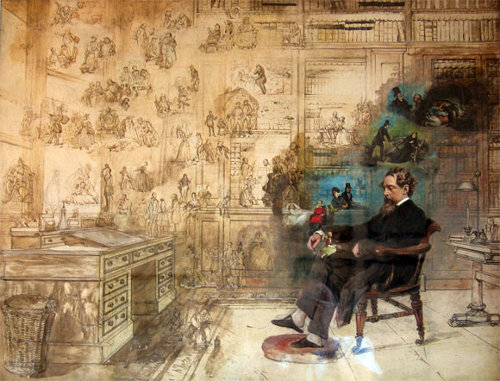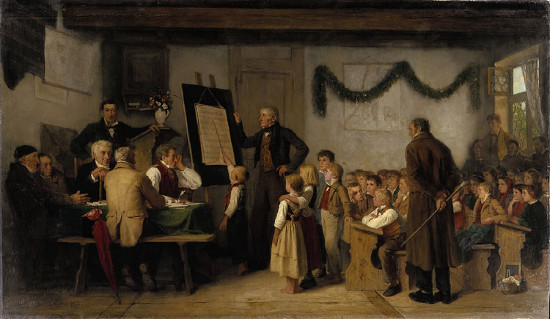
In scenes of pathos, Charles Dickens often wrote unconsciously in blank verse. These paragraphs from The Old Curiosity Shop, arranged as poetry, show a strong iambic rhythm:
And now the bell — the bell
She had so often heard by night and day
And listened to with solid pleasure,
E’en as a living voice —
Rung its remorseless toll for her,
So young, so beautiful, so good.
Decrepit age, and vigorous life,
And blooming youth, and helpless infancy,
Poured forth — on crutches, in the pride of strength
And health, in the full blush
Of promise — the mere dawn of life —
To gather round her tomb. Old men were there,
Whose eyes were dim
And senses failing —
Granddames, who might have died ten years ago,
And still been old — the deaf, the blind, the lame, the palsied,
The living dead in many shapes and forms,
To see the closing of this early grave!
What was the death it would shut in,
To that which still would crawl and creep above it!
Along the crowded path they bore her now;
Pure as the new-fallen snow
That covered it; whose day on earth
Had been so fleeting.
Under that porch where she had sat when Heaven
In mercy brought her to that peaceful spot,
She passed again, and the old church
Received her in its quiet shade.
Richard Horne presented these stanzas in New Spirit of the Age in 1844. “Throughout the whole of the above, only two unimportant words have been omitted — in and its; ‘granddames’ has been substituted for ‘grandmothers,’ and ‘e’en’ for ‘almost.’ All that remains is exactly as in the original, not a single word transposed, and the punctuation the same to a comma.”
“It is not an affectation in me, nor have I the least desire to write them in that metre,” Dickens wrote to an inquirer that April, “but I run into it, involuntarily and unconsciously, when I am very much in earnest. I even do so, in speaking.”
“I am not prepared to say that this may not be a defect in prose composition, but I attach less importance to it than I do to earnestness. And considering that it is a very melodious and agreeable march of words, usually; and may be perfectly plain and free; I cannot agree with you that it is likely to be considered by discreet readers as turgid or bombastic, unless the sentiments expressed in it, be of that character. Then indeed it matters very little how they are attired, as they cannot fail to be disagreeable in any garb.”
But he seems to have grown self-conscious about it. In 1846 he wrote to John Forster regarding The Battle of Life, “If in going over the proofs you find the tendency to blank verse (I cannot help it, when I am very much in earnest) too strong, knock out a word’s brains here and there.”





